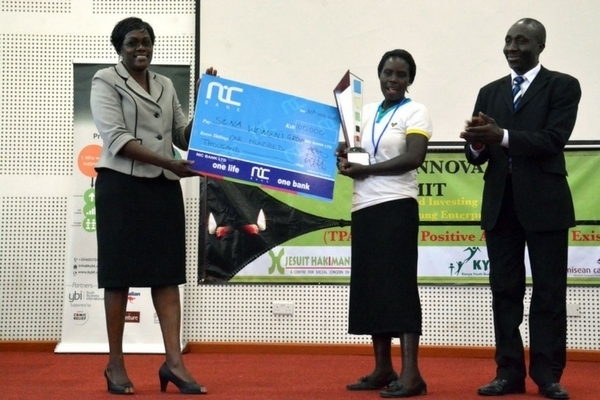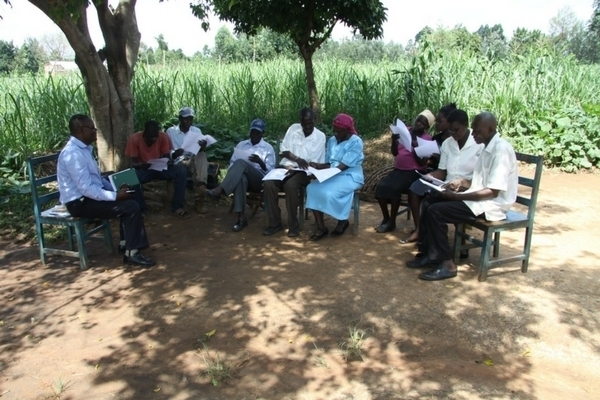
A group of single mothers in Western Kenya access training and resources from the Jesuit Hakimani Centre to create employment for themselves and promote healthy eating by starting a group that makes bread and cakes from traditional crops.
Sena Women’s Group
Sena Women’s Group is a shining example of a simple idea that was developed through training by the Jesuit Hakimani Centre. It has transformed the lives of the women in the Bungoma region of western Kenya who comprise the group and their families, as well as the wider community of those who were indirectly involved in the project. Most of the women in the group are single mothers and are therefore almost fully dependent on it for their income. Thanks to its success, they are now able to afford to cover their basic needs and to pay school fees and provide for their children.
Jesuit Hakimani Centre
The Jesuit Hakimani Centre (JHC) in Nairobi, Kenya, is a research, formation, and social action institute for Eastern Africa, that aims to transform the lives of oppressed or marginalised people. Its name ‘Hakimani’ combines the Kiswahili words ‘haki’ (justice) and ‘imani’ (peace with faith).
Carolyn Wamene
Carolyn Wamene is a woman born and bred in Bungoma County, in the heart of Western Kenya. As a mother-of-five who has struggled to make ends meet for her young family, she has faced challenges that have instilled in her resilience and courage. Some time ago, Carolyn met with leaders from the JHC to discuss the opportunities for developing an innovative project that would utilise local crops and encourage healthy eating habits locally.
After the initial meeting, and some subsequent training with the Centre, Carolyn decided to make the most of her readily available resources in her home. The vegetables sweet potato, pumpkins and cassava, are plentiful in the region. These traditional, nutritious crops are grown in many places but are slowly losing popularity as people adopt modern methods and styles of cooking. Carolyn then started the Sena Women’s Group to make popular modern snacks such as cakes, mandazi, and bread using these crops, adding value to the products and also promoting healthy eating by enabling people to use them in a way that keeps their nutritional value.

National Prize for Sena Women’s Group
Sena Women’s Group attended a national summit that brought together hundreds of youths, mentors and political leaders, and was determined to win the prize at a competition there. The group put in a concerted effort with their products and their excellence won them the prize for best overall innovative idea in the competition. The Hakimani team did not stop at awarding the group; they followed up on them during the post-summit evaluation.
‘Think Positive Alternatives Exist’ Initiative
‘Think Positive Alternatives Exist’ (TPAE) is a Hakimani Centre project that trains young people to develop their talents and use those skills to create employment for themselves. In Bungoma, where the ‘Sena Women’s Group’ is located, the TPAE team met with an agricultural officer who was following up on the group. He had introduced the concept of farming and value addition to the group and was excited to note their progress. This aligned well with the government initiatives which seek to improve farmers’ livelihood using the Sena Women’s Group as a case study for other farmers to emulate. The agricultural officer promised to keep empowering the group with different products and linking them up with the market.
Funding for the Group
By 2015, the group had already obtained money from the Uwezo fund (a five-year initiative that aims to improve competencies in literacy and numeracy among children aged 6-16 years old in Kenya, Tanzania and Uganda) and a farm where they grow the crops. They also won the TPAE top prize of KSh 100,000 to boost their business. They accessed Uwezo fund after intensive training by the TPAE team on the procedures of acquiring government funds, and harnessing the connections that were created by the team.
Through networking with the help of the Jesuit Hakimani Centre, the group received funds from several NGOs and their lives have been entirely transformed. Ten members of the group are employed directly in the project, and there are also over twenty indirect jobs for the people picking and supplying the goods. Their products have gained market share and popularity over time because of the health benefits of the ingredients.
Author: , Communications Officer at Jesuit Hakimani Centre in Nairobi, Kenya.

